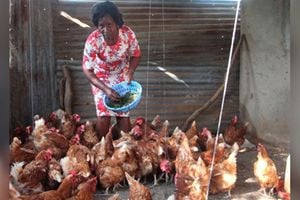Mothering mangroves back to life

Mtangawanda women group members planting mangrove trees along the shores of Pate Island in Lamu.
What you need to know:
- The women earn more from students who visit the area to conduct research.
- They use the funds to provide bursaries for children in the community.
- The group has also trained youths who are engaging in crab farming.
In the early 2000s, Zulfa Hassan, a 37-year-old procurement professional, witnessed her village on Pate Island, Lamu County, suffer environmental degradation due to climate change. Inspired to make a difference, she embarked on a journey to conserve the coastal shores of the Indian Ocean by planting mangroves.
"I realised many of us women were idling around the village waiting for our husbands to bring food. We were dependent on them. However, I went to the village, gathered 14 women and we started restoring the mangroves to keep ourselves busy. Today, we have grown to 150," she narrated.
The mother of five said a benchmarking visit to Madagascar opened their eyes to the opportunities beneath the ocean.
The Mtangawanda Mangrove Restoration Women Group, chaired by Ms Hassan, learned about the different types of mangroves globally, how to plant them and how to generate income through their restoration. However, they faced a significant setback due to religion.
"Our main challenge as Muslim women was not being allowed to work but stay at home and take care of our families. When we started this initiative, our men looked down on us and never supported us. They viewed us as rebellious. In our community, women are supposed to be seen and not heard,” said Ms Hassan.

Zulfa Hassan holds a crab harvested from the mangroves along the Pate Island.
But despite the traditional practices that discriminate against women from the Bajuni community, the group has managed to plant more than 100,000 mangrove trees and 20,000 nurseries after undergoing training sponsored by the Northern Rangelands Trust and The Nature Conservancy.
The women planted Rhizophora mucronate, popularly known as Mkoko, Sonneratia ala, Ceriops tagal and Bruguiera gymnorrhiza — since the trees could survive in salty water.
Mr John Kareko, a marine expert, noted that science is critical in marine conservation.
“When you look at fisheries, they depend on several ecosystems to thrive. For instance, crabs cannot survive without the mangrove ecosystem because they feed on them,” said Mr Kareko. He added that crabs breed in mangrove habitats.
“The crabs will not survive if mangroves are destroyed. If there’s no feeding and breeding area, they cannot grow to the right size, and there will be no sufficient catch for fishers,” he said.
Before undergoing the mangrove planting and restoration training, the women had planted 10,000 seedlings, but only 500 germinated.
"That is because we did not have enough knowledge. We need protective gear to help us navigate through the muddy terrain where we do the planting and boats to take us to far flung areas for the same exercise,” added Ms Hassan.
She noted that their husbands have since managed to combat the harmful traditional practices and are proud of the women who have helped restore marine life, which has been their source of livelihood.
Apart from planting mangroves, the women also collect plastic bottles along the shores to protect the mangroves and other marine life from being choked.

Mtangawanda women group planting mangrove trees along the shores of Pate Island.
They then recycle the bottles and make jewellery such as earrings, necklaces and hair pins, which are sold to locals and tourists visiting the area.
“But we are planning to build a plastic house,” she added.
The women also earn more from students who visit the area to conduct research. They use the funds to provide bursaries for children in the community. The group has also trained youths who are engaging in crab farming.
"Mangrove restoration has grown the population of crabs,” added Ms Hassan.
The group has also constructed a nursery school at Mtangawanda Primary School with the help of the county government, where they teach learners about conservation.
“I have achieved a lot through mangroves. The communities should understand that when you empower a woman, you have empowered the whole community. I am a living example,” added Ms Hassan.
The group has received donations from different organisations, including bursaries and start-up funds to boost their businesses.
Mohamed Mbwana, a crab fisherman, has witnessed how the women's venture has preserved the environment and the benefits that come with it.
“I was the first man to realise the efforts of these women and assisted them in doing the hard jobs like pruning weeds. We have sensitised residents on the importance of mangrove restoration and crab farming, which goes hand in hand,” he said.
He noted that mangroves are a breeding area for crabs and other marine life.
"There is a need to ensure that our mangroves are taken care of,” said Mr Mbwana. He advised other communities to support women in everything that they do.
"Do not limit women. Crab fishing is a source of livelihood for most of us in this community. A kilogramme of crabs goes for Sh1,400, and we use the proceeds to take care of our families; thanks to our women's restoration activities,” he said.




